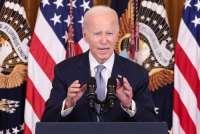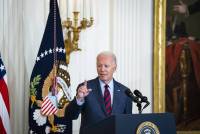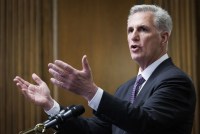Latest KFF Health News Stories
5 Things to Know About the New Drug Pricing Negotiations
The Biden administration unveiled the first 10 drugs subject to price negotiations, taking a swipe at the pharmaceutical industry. But what does it mean for patients?
Exclusive: CMS Study Sabotages Efforts to Bolster Nursing Home Staffing, Advocates Say
Research commissioned by the Centers for Medicare & Medicaid Services analyzed only staffing levels below what experts have previously called ideal. Patient advocates have been pushing for more staff to improve care.
KFF Health News' 'What the Health?': Abortion Pill’s Legal Limbo Continues
A federal appeals court issued a split decision on whether the abortion pill mifepristone should remain on the market — rejecting a lower court’s decision to effectively cancel the drug’s FDA approval in 2000, while ordering the rollback of more recent rules that made the drug easier to obtain. Nothing changes immediately, however, as the Supreme Court blocked the lower court’s ruling in the spring. It will be up to the high court to determine whether the pill remains available in the U.S. and under which conditions. Sarah Karlin-Smith of the Pink Sheet, Alice Miranda Ollstein of Politico, and Shefali Luthra of The 19th join KFF Health News’ chief Washington correspondent, Julie Rovner, to discuss these issues and more. Plus, for “extra credit,” the panelists suggest health policy stories they read this week they think you should read, too.
Feds Say Hospitals That Redistribute Medicaid Money Violate Law
Federal officials are trying to clamp down on private arrangements among some hospitals to pay themselves back for the Medicaid taxes they’ve paid. State health officials and the influential hospital industry argue that regulators have no jurisdiction over the agreements.
Proposed Rule Would Make Hospital Prices Even More Transparent
A Biden administration proposal would help standardize the data on prices that hospitals provide to patients, increase its usefulness to consumers, and boost enforcement. Previous rules gave hospitals too many loopholes.
Everything Old Is New Again? The Latest Round of Health Policy Proposals Reprises Existing Ideas
House Republican legislation promises more health insurance options but fewer protections, even as the Biden administration seeks to rein in short-term plans, which were expanded in the Trump era.
FDA Head Robert Califf Battles Misinformation — Sometimes With Fuzzy Facts
FDA Commissioner Robert Califf has called misinformation one of the deadliest killers in the United States. As the FDA tries to fight that scourge, it sometimes stumbles.
KFF Health News' 'What the Health?': The Long Road to Reining In Short-Term Plans
President Biden made good on a campaign promise this week with a proposal that would limit short-term health insurance plans that boast low premiums but also few benefits. Meanwhile, the Supreme Court’s decision to outlaw affirmative action programs could set back efforts to diversify the nation’s medical workforce. Alice Miranda Ollstein of Politico, Amy Goldstein of the Washington Post, and Rachel Cohrs of Stat News join KFF Health News’ chief Washington correspondent Julie Rovner to discuss these issues and more. Also this week, Rovner interviews KFF Health News’ Bram Sable-Smith, who reported the latest KFF Health News-NPR “Bill of the Month” about how a hospital couldn’t track down a patient, but a debt collector could.
CDC to Reduce Funding for States’ Child Vaccination Programs
Citing the recent debt ceiling deal, the CDC is trimming its funding to child vaccination programs that focus on communities vulnerable to disease outbreaks. The cuts come despite data showing the percentage of children getting vaccinated has dropped in recent years.
KFF Health News' 'What the Health?': A Year Without Roe
It’s been a year since the Supreme Court overturned Roe v. Wade and, with it, the nationwide right to abortion. The decision in Dobbs v. Jackson Women’s Health Organization set off widespread uncertainty in government and the courts about the legality or illegality of the procedure. But the decision has had other consequences too, including affecting where health professionals choose to locate. In this special episode of KFF Health News’ “What the Health?” Alice Miranda Ollstein of Politico, Shefali Luthra of The 19th, and Sandhya Raman of CQ Roll Call join KFF Health News chief Washington correspondent Julie Rovner to discuss these issues and more. Also this week, Rovner interviews KFF’s Alina Salganicoff about the organization’s research and other work on women’s health policy over the past year.
The Debt Ceiling Deal Takes a Bite Out of Health Programs. It Could Have Been Much Worse.
A bipartisan deal to raise the government’s borrowing limit dashed Republican hopes for new Medicaid work requirements and other health spending cuts. Democrats secured the compromise by making relatively modest concessions, including ordering the return of unspent covid funds and limiting other health spending.
KFF Health News' 'What the Health?': The Abortion Pill Goes Back to Court
A three-judge appeals court panel heard testimony this week about revoking the FDA’s 22-year-old approval of a key pill used in medication abortion and miscarriage management. The judges all have track records of siding with abortion foes. Meanwhile, as the standoff over raising the federal debt ceiling continues in Washington, a major sticking point is whether to impose work requirements on recipients of Medicaid coverage. Victoria Knight of Axios, Rachel Roubein of The Washington Post, and Sandhya Raman of CQ Roll Call join KFF Health News chief Washington correspondent Julie Rovner to discuss these issues and more.
PBMs, the Brokers Who Control Drug Prices, Finally Get Washington’s Attention
Drugmakers, pharmacies, and physicians blame pharmacy benefit managers for high drug prices. Congress is finally on board, too, but will it matter?
El gobierno alerta sobre tarjetas de crédito para pagar facturas médicas
La Oficina de Protección Financiera del Consumidor estimó en su informe que, en solo tres años, de 2018 a 2020, las personas han estado pagando $1,000 millones en intereses diferidos de tarjetas de crédito médicas y otros financiamientos médicos.
KFF Health News' 'What the Health?': Health Programs Are at Risk as Debt Ceiling Cave-In Looms
A warning from the Treasury Department that the U.S. could default on its debt as soon as June 1 has galvanized lawmakers to intervene. But there is still no obvious way to reconcile Republican demands to slash federal spending with President Joe Biden’s demand to raise the debt ceiling and save the spending fight for a later date. Meanwhile, efforts to pass abortion bans in conservative states are starting to stall as some Republicans rebel against the most severe bans. Joanne Kenen of the Johns Hopkins Bloomberg School of Public Health and Politico, Rachel Cohrs of Stat, and Alice Miranda Ollstein of Politico join KFF Health News chief Washington correspondent Julie Rovner to discuss these issues and more.
Biden Administration Issues New Warning About Medical Credit Cards
Americans paid an estimated $1 billion in deferred interest on medical debt in just three years, the Consumer Financial Protection Bureau reports. The agency warns against medical credit cards, which are often pitched right in doctors’ offices.
KFF Health News' 'What the Health?': Dancing Under the Debt Ceiling
House Republicans passed their plan to raise the nation’s debt ceiling, along with major cuts to health (and other domestic) programs. Unlikely to become law, it calls for new work requirements for adults on Medicaid. Meanwhile, state efforts targeting trans people bear a striking resemblance to the fight against abortion rights. Jessie Hellmann of CQ Roll Call, Shefali Luthra of The 19th, and Sarah Karlin-Smith of the Pink Sheet join KFF Health News chief Washington correspondent Julie Rovner to discuss these issues and more. Also this week, Rovner interviews Renuka Rayasam, who reported the latest KFF Health News-NPR “Bill of the Month” feature, about a specialist’s demand to be paid as much as $15,000 before treating a woman’s serious pregnancy complication.
¿Se podrá cumplir con la meta de terminar con la epidemia de VIH para 2030?
Debido a las interrupciones de la pandemia, los funcionarios federales no han tenido estimaciones sólidas de nuevas infecciones o el número de personas que viven con VIH desde finales de 2019.
US Officials Want to End the HIV Epidemic by 2030. Many Stakeholders Think They Won’t.
The federal government’s ambitious plan to end the HIV epidemic, launched in 2019, has generated new ways to reach at-risk populations in targeted communities across the South. But health officials, advocates, and people living with HIV worry significant headwinds will keep the program from reaching its goals.
The Biden Administration Vowed to Be a Leading Voice on Opioid Settlements But Has Gone Quiet
Billions of dollars are headed to state and local governments to address the opioid crisis. Policy experts and advocates expect the federal government to play a role in overseeing the use of the money. Failure to do so, they say, could lead to wasted opportunities. And, since Medicaid helps pay health care costs, the feds could have a claim to portions of states’ opioid settlements.



















